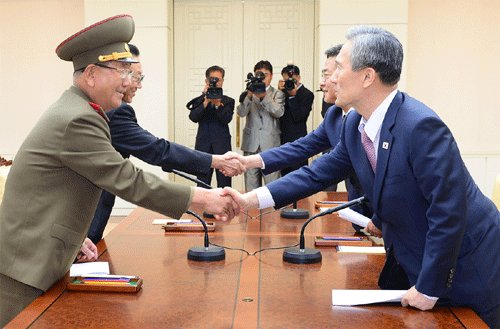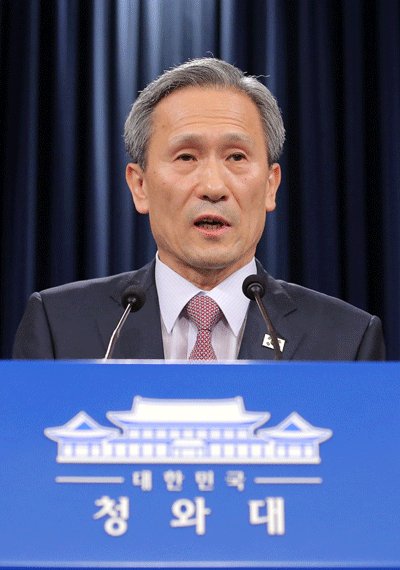North Korea on Tuesday expressed regret over a recent land mine blast in the Demilitarized Zone and resulting injuries on South Korean soldiers and agreed to lift the “quasi-war state” in return for Seoul’s conditional revocation of anti-Pyongyang broadcasts.
The two Koreas also agreed to hold formal talks to improve their relations in Seoul or Pyongyang “at an early date” and working-level discussions in early September to arrange reunions of separated families in time for the upcoming Chuseok holidays.
The two Koreas also agreed to hold formal talks to improve their relations in Seoul or Pyongyang “at an early date” and working-level discussions in early September to arrange reunions of separated families in time for the upcoming Chuseok holidays.

The six-point agreement marked a breakthrough following 43-hour marathon negotiations at the border village of Panmunjeom between Kim Kwan-jin, chief of Cheong Wa Dae’s National Security Office, and Unification Minister Hong Yong-pyo, and Hwang Pyong-so, vice chairman of the North’s National Defense Commission and director of the General Political Bureau of the (North) Korean People’s Army, and Kim Yang-gon, director of the North’s United Front Department and a secretary of the ruling Workers’ Party’s Central Committee.
“We focused on extracting an apology for the land mine provocation and other recent incidents by North Korea as their subject, and a promise to prevent a recurrence, which in fact had resulted in protracted negotiations,” Kim Kwan-jin said at a news conference at Cheong Wa Dae.
“But the reason why we ceaselessly called for preventive steps was that without them, there will be another provocation threatening public safety and then again a provocation -- we will not be able to break the vicious cycle.”

Under the deal, South Korea will halt loudspeaker broadcasts along the Military Demarcation Line starting 12 p.m. Tuesday, “unless any abnormal situation takes place.”
The program was restarted early this month after an 11-year freeze in retaliation for the Aug. 4 explosion of three mines suspected to have been planted by North Korean soldiers who illegally crossed the border. The incident inflicted serious injuries on the legs of two South Korean Army staff sergeants.
Though the accord did not stipulate preventive measures, the condition ensures that the broadcasts can be resumed at any time if the communist country stages a provocation in the future, Kim said.
The agreement is set to defuse cross-border tension that had hit new highs in recent weeks, with the North forward-stationing offensive weapons and the South engaging in a show of force to deter a potential attack.
It will also boost hopes for a long-awaited thaw in inter-Korean relations after the sides have failed to capitalize on rare past momentums, and possibly a summit between President Park Geun-hye and North Korean leader Kim Jong-un, though Kim Kwan-jin dismissed it as “premature.”
As he took the podium, the former defense minister appeared much tired from the grueling negotiations that kicked off Saturday. Yet he was adamant about Park’s longstanding principle to respond sternly to Pyongyang’s provocations while leaving the door open for dialogue and cooperation, a key thread running through her much-trumpeted “trustpolitik” approach.
“Having created tension to gain concessions so far, North Korea must have realized that this will never work with our administration,” Kim added.
By Shin Hyon-hee (heeshin@heraldcorp.com)



![[Exclusive] Korean military set to ban iPhones over 'security' concerns](http://res.heraldm.com/phpwas/restmb_idxmake.php?idx=644&simg=/content/image/2024/04/23/20240423050599_0.jpg&u=20240423183955)



![[Herald Interview] 'Amid aging population, Korea to invite more young professionals from overseas'](http://res.heraldm.com/phpwas/restmb_idxmake.php?idx=644&simg=/content/image/2024/04/24/20240424050844_0.jpg&u=20240424200058)


![[Pressure points] Leggings in public: Fashion statement or social faux pas?](http://res.heraldm.com/phpwas/restmb_idxmake.php?idx=644&simg=/content/image/2024/04/23/20240423050669_0.jpg&u=)








